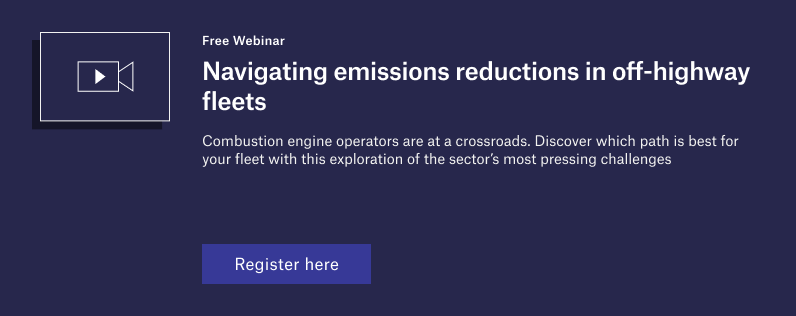
Mobile machinery operators worldwide are working towards reducing operational emissions in the off-highway industry. Many operators have already set short-term targets and are evaluating long-term goals to achieve net-zero emissions. However, this process isn’t straightforward or as simple as just swapping out equipment. With tighter regulations beginning to bite, is there a way forward for operators that reduces emissions but also keeps downtime to a minimum?
On Wednesday 22nd May, Texaco Lubricants and GlobalData are hosting an exclusive webinar that will explore the main issues that all fleet operators must tackle as they progress towards CO2 emission reductions. Join us as we explore the journey towards electrification, discuss the sectors most pressing challenges – such as downtime – and what this means for operators today in a world of tighter regulations. To secure your place at the table, click here now to register for this FREE event.

Diesel-powered mobile equipment significantly impacts businesses’ Scope 1 emissions, raising concerns about its long-term future. With tighter emissions regulations, operators are exploring alternative options like battery-electric vehicles and hydrogen-powered machines, but during this transition, the off-highway industry still needs to achieve its emissions goals.
As operators look to fulfil their obligations, they are presented with the problem of keeping machinery in operation for as long as possible – with as little downtime as possible – particularly as take-up of electric and hydrogen alternatives is still relatively low.
Therefore, combustion engine operators are faced with a choice to make. They can either choose to continue as normal and run their operations at levels that may lack efficiency and risk economic loss, or they can take actions that will benefit their business in the interim. During this transitional period, many businesses are choosing to utilise renewable diesel and biofuels.
Texaco Lubricants’ range of Delo products is well placed to assist operators in this transition. The range offers a variety of lubricants formulated to help deliver protection and performance, and contributes to the operational reliability of off-highway applications.
Texaco has developed Texaco Delo 600 ADF, a premium performance synthetic-technology long-drain engine oil that focuses specifically on the performance and maintenance of Diesel Particulate Filters (DPFs). The low ash technology within the product helps to promote reduced equipment downtime and improved fuel economy performance, as well as helping to reduce DPF clogging and service costs.
In times of change, the Texaco Delo range offers an improved and effective option for operators.
Don’t miss this chance to join us on May 22nd to discuss fleet operators’ concerns about CO2 emissions, electrification, downtime, and regulations in the industry. Registration for this exclusive webinar is FREE here.


